You are viewing the Cultures of Knowledge Blog archive for the ‘Lectures’ Category:
James Brown
May 16, 2011
Events, Lectures, Project Updates
Tags: Databases, Editions, Eighteenth Century, Gottfried Wilhelm Leibniz, History of Philosophy, Mathematics, Networks, Seventeenth Century
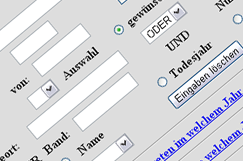
Visit Leibniz correspondence database.
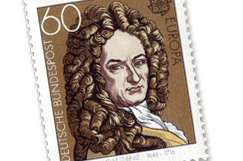
Leibniz depicted on a 1980 stamp.
In the second paper of our seminar series on Thursday 12 May, Dr Nora Gädeke (Gottfried Wilhelm Leibniz Bibliothek) provided us with a privileged insight into ‘Work in Progress: Leibniz’s Correspondence Network’, currently being reconstructed by the Akademie-Ausgabe edition, a group of collaborators in Potsdam, Münster, Hannover, and Berlin, under the aegis of the Academies of Science of Göttingen and Berlin-Brandenburg. In a detailed and reflexive analysis, Gädeke outlined the epistolary activities and contacts of this prolific correspondent, whose surviving letters number c.15,000-20,000, and who saw letter-writing as ‘one of the main characteristics of his life’. She also described the editorial principles and strategies of the definitive, multi-volume Akademie-Ausgabe edition, which include reproducing all items of Leibniz’s corpus chronologically and topically (including all extant copies), as well as the creation of a full critical apparatus. Further, she discussed the practical and conceptual challenges posed by such an ambitious, ‘cinematic’ enterprise. Gädeke concluded her talk, and introduced the question and answer session, by demonstrating the public database of Leibniz’s correspondence, one of a series of innovative online tools developed by the project to facilitate editorial work on the hard-copy volumes and disseminate some key findings beyond the edition itself. Discussion focused on a range of topics, including: the role of patronage in Leibniz’s network; information as a form of ‘social capital’ in early modern Europe; the importance of superimposing places in which letters were sent or received with geopolitical subtleties; Leibniz’s approach to storing and ordering his letters; his motivations for keeping them in the first place; and the key role online databases can play in supporting and publicizing conventional scholarly work on major corpora. Seminars take place in the Faculty of History on George Street on Thursdays at 3pm. For future talks in the series, please see the seminar webpage.
 Podcast now available on the seminar page!
Podcast now available on the seminar page!
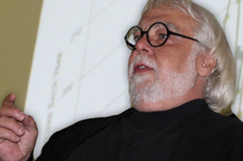
Professor Hatch during his talk.
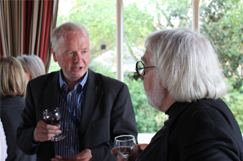
Discussions continue over wine.
In the opening paper of our second seminar series on Thursday 5 May, Professor Robert A. Hatch (University of Florida) got us off to a rousing start with a paper entitled ‘De-Centring the Big Picture: The Scientific Revolution and the Republic of Letters’. In a wide-ranging and suggestive analysis, Hatch argued that correspondence networks were the foremost facilitators of the new science in the early modern period (and vice versa), and for the creation and of vibrant intellectual communities around emergent fields such as astronomy. Compared to printed texts, suggested Hatch, letters were immediate and inclusive, situated the discussion of intellectual themes within the minutia of daily life, and were the primary medium for the gestation and discussion as well as the ultimate dissemination of scientific ideas in this period. The importance of scribal publication as an end in itself throughout the seventeenth century was further emphasized during discussion. Hatch illustrated his talk with a dazzling series of maps and graphs generated from his impressive personal database of scientific correspondences (which includes metadata on the letters of Peiresc, Gassendi, Bouilliau, and many other luminaries), although the necessity of combining quantitative exercises with qualitiative assessments of the formation of epistolary archives was underlined during a lively question and answer session. Seminars take place in the Faculty of History on George Street on Thursdays at 3pm. For future talks in the series, please see the seminar webpage.
James Brown
April 18, 2011
Events, Lectures, Project Updates
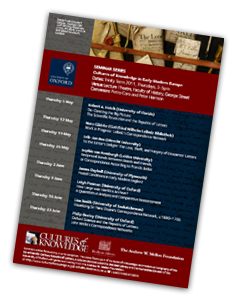 Please join us for the second Cultures of Knowledge seminar series, which will once again take place in Trinity Term 2011 on Thursdays at 3–5pm in the Lecture Theatre of the History Faculty. Entitled ‘Cultures of Knowledge in Early Modern Europe’, and convened by Pietro Corsi and Peter Harrison, the seminar features another impressive programme of eight leading international authorities on seventeenth-century correspondents and correspondence networks. Papers and discussion will be followed by a wine reception. For the full programme and further details, please see the seminar webpage. The seminar poster (pdf) can be downloaded on the right.
Please join us for the second Cultures of Knowledge seminar series, which will once again take place in Trinity Term 2011 on Thursdays at 3–5pm in the Lecture Theatre of the History Faculty. Entitled ‘Cultures of Knowledge in Early Modern Europe’, and convened by Pietro Corsi and Peter Harrison, the seminar features another impressive programme of eight leading international authorities on seventeenth-century correspondents and correspondence networks. Papers and discussion will be followed by a wine reception. For the full programme and further details, please see the seminar webpage. The seminar poster (pdf) can be downloaded on the right.
 A recent correspondence-related public lecture by our Martin Lister Research Fellow Dr Anna Marie Roos has now been published as a podcast. The lecture, which took place at Oxford’s Museum of the History of Science on Tuesday 26 October, was entitled ‘The Oxford Philosophical Society and the Royal Society: A Meeting of Minds?’, and described the formation of the Oxford group, the work done under the direction of Robert Plot, and its relationship with the Royal Society: a tale of collaboration as well as rivalry. The podcast is available for listening and downloading on the MHS website.
A recent correspondence-related public lecture by our Martin Lister Research Fellow Dr Anna Marie Roos has now been published as a podcast. The lecture, which took place at Oxford’s Museum of the History of Science on Tuesday 26 October, was entitled ‘The Oxford Philosophical Society and the Royal Society: A Meeting of Minds?’, and described the formation of the Oxford group, the work done under the direction of Robert Plot, and its relationship with the Royal Society: a tale of collaboration as well as rivalry. The podcast is available for listening and downloading on the MHS website.
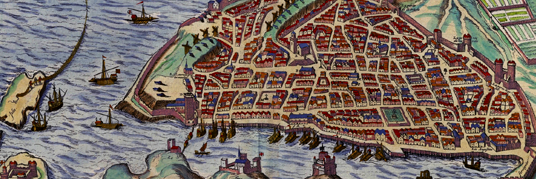
Marseille in 1575. View sourced from Historic Cities.
In the eighth and final installment of the Project’s inaugural seminar series on Wednesday 23 June, held in conjunction with the conference John Selden (1584–1654): Scholarship in Context, Professor Peter Miller (Bard Graduate Center) delivered a wide-ranging overview of ‘Peiresc’s Mediterranean Merchant Network’. Focusing on the letters sent by the polymath from Marseille in the early seventeenth century, Miller elaborated a fascinating story of ‘Peiresc and the sea’ in four parts (which focused respectively on Marseille, space and time in the Mediterranean, merchants, and names). The small, fast nature of Marseillaise ships, especially compared to Venetian craft, meant that letters dispatched from the French port arrived at their destinations quickly (reaching Leiden, for example in fifteen days), and Peiresc’s epistolary activities in the Mediterranean were reliant on an extensive maritime network of non-elite merchants, captains, and sailors, whose identities are in many cases painstakingly recorded (along with other names and biographies) in the letters themselves. This means that it is possible to reconstruct this particular correspondence ‘cloud’ (in Miller’s phrase) in particular detail, and during discussion he provided us with a tantalising glimpse into his forthcoming digitisation initiative which will both visualise Peiresc’s Mediterranean network and link it in an innovative way to an online monograph. For past lectures in the series, please see the seminar webpage; details of the 2011 series will be available shortly.
James Brown
June 23, 2010
Events, Lectures, Project Updates
Tags: Digitization, Europe, France, Isaac Casaubon, Joseph Justus Scaliger, Low Countries, Richard Thomson, Seventeenth Century
In the seventh and penultimate installment of the Project’s seminar series on Thursday 10 June, a large audience enjoyed papers by Dr Dirk van Miert (Huygens Institute) and Dr Paul Botley (Warburg Institute), both postdoctoral fellows on the Scaliger Correspondence Project, established by Professor Anthony Grafton. In his opening contribution, van Miert explored ‘The Seventeenth-Century Culture of Editing Scholarly Correspondences: The Case of Joseph Scaliger’. Via a fascinating case study of several early seventeenth-century editions of the correspondence of the French scholar (especially that prepared by Daniel Heinsius), he argued that in an early instance of the ‘institutionalisation’ of the Republic of Letters it was increasingly common for lavish printed editions of the correspondence of intellectuals to appear during or immediately after their lifetimes, often prepared by former students (Heinsius studied under Scaliger). In his concluding contribution, Botley switched the focus to two less high-profile denizens of the Republic of Letters in a paper entitled ‘The Letters of Isaac Casaubon (1559–1614) and Richard Thomson (c.1570–1613)’. Botley described his attempts to bring Casaubon’s c.2400 surviving letters (254 exchanged with Scaliger) to a wider scholarly audience by means of a definitive online edition, and introduced us to the letters of the little-known philologist and Church of England clergyman Richard Thomson, a regular correspondent of both Scaliger and Casaubon. Seminars take place in the Faculty of History on George Street on Thursdays at 3pm. For past seminars in the series, please see here.
 Podcast now available on the seminar page!
Podcast now available on the seminar page!
Podcast now available on the seminar page!






 A recent correspondence-related public lecture by our
A recent correspondence-related public lecture by our 

 Join
Join 